286 Leadership: Think, But Don’t Over-Think
Podcast: Play in new window | Download (Duration: 32:06 — 30.4MB)
Subscribe: Apple Podcasts | Spotify | RSS | More
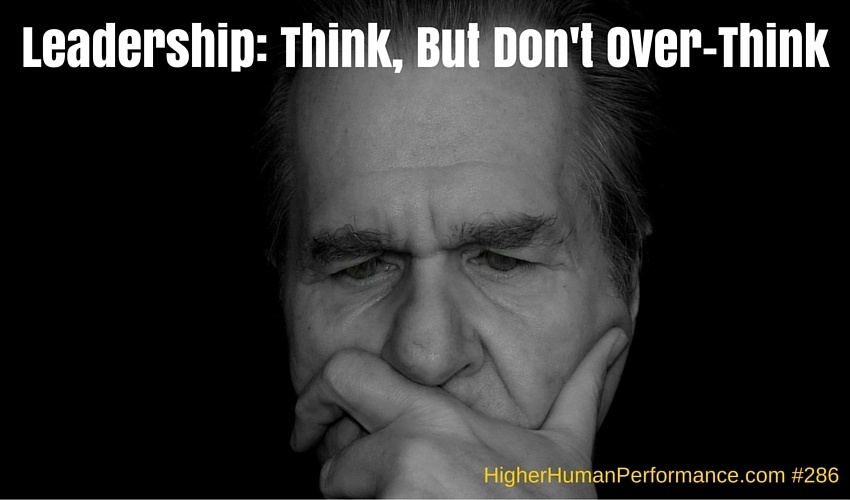
Data. It’s the business strategy road map for every organization. Every organization.
What’s your business? Who are you serving? How are you serving them? What do they want? How and when do they want it?
Today’s high performing organizations aren’t merely reviewing past performance, they’re focused on predicting their own future – but maybe better said, they’re devoted to making their future come true based on data (evidence). Evidence-based leadership was my topic a few episodes ago, but that was just a high-level view of it. I didn’t even really mention the big elephant in the room – the major obstacle for many leaders to follow evidence. Desire. Many just don’t want to see or know the evidence. They want to make the decision based on their preferences, experiences or gut-feel. That’s why far too many CEO’s and top leaders relish their authority. They want to use that power to make the decision. Maybe they want to prove how smart they are. Maybe they feel it’s why they’re in that top seat. But it’s bull-headed and foolish in today’s world. The best organizations on the planet don’t run that way and their CEO’s are among the most powerful people in the world. Look at Amazon, Netflix and Google.
Being Data-Driven About Our Own Leadership
The point of today’s show is to be fast in gathering and dissecting data, but we also have to be fast to take proper action. It’s one thing to think – to collect data and to analyze it. It’s something else to over-think it. That is, to keep gathering data in hopes that we can fill every empty gap that may exist in our knowledge of the market, our customers or our business.
But before we can really dive into data, we probably need to look inside ourselves as leaders. There are 3 perspectives crucial to every leader. I discussed these in episode 284.
How do you see yourself?
How do others see you?
How do you want to be seen?
I’ve found that even the most outwardly confident leaders sometimes struggle with a loss of confidence. Nobody seems immune from head trash. Some handle it more proficiently, but we all have to wrestle with it. Being data-driven may not really be so disconnected from these 3 questions if you really think about it though.
You see yourself the way you see yourself for a reason. Or reasons. They may range from very credible to very incredible. I’ve sat across business owners or C-suite executives who openly confessed how they felt they’d be “found out” at any moment. They felt as though they were fooling the universe, but there was no evidence to verify their head trash. Quick to ascribe their success to timing or luck, or both, they sometimes feel as though they’re actors in a grand play that is their life. They’re wrong, of course, but they think what they think.
I’ve also seen other executives who did have a pretty defined history of some great fortune and timing, but they insist that their brilliance is the primary reason for their success. They don’t see themselves like those earlier folks. Two completely different viewpoints. Two perspectives of people who see themselves very differently.
Whether you see yourself as being all that and a bag of chips, or you see yourself being a complete fraud — it matters. My advice is to understand that you may not be as good as you think you are, but you’re probably not as bad as you feel you are either. We’re all complex. Our pasts are dotted with failures, success and somethings that fall in between the two. Our accomplishments are rarely due solely to our own work. Most (if not all) of us owe somebody for lending us a hand along the way. Maybe it was an introduction that came as at an ideal time. Maybe it was an opportunity that arrived when we needed it the most. I have a list of people in my wake who have helped me along the way. I wouldn’t be where I am today without the help and support of MANY people. I am NOT a self-made man. Good thing, too – cause I know I’m not that good. But I also know I’m not that bad.
Good things happen to bad people and bad things happen to good people. So, I’d encourage you to get over yourself if you feel you alone are responsible for your position of leadership. I’d encourage you to stop feeling like a fraud if you feel you’re unworthy of your position. Instead, I could likely argue that we’re all likely exactly where we belong. We’re where we are as leaders because of the sum total of our decisions and choices. We acted based on those choices and here we are. Maybe EXACTLY where we belong. Now, the question changes…what are we going to do with the leadership we’ve got?
Examine the data that put you where you are. Think about the people who have served you. Are you devoted to be that somebody for others? Or are you mostly interested in protecting yourself?
Great leaders don’t spend their days protecting themselves. They take the bullets so others don’t have to. It’s in the DNA of the greatest leaders to serve, serve, serve. They know that’s the road to having the biggest impact on the largest number of people. And if there’s one thing every great leader has in common it’s this – to make a difference! You have to believe in your ability to make a positive difference. You have to know in your gut that if you weren’t the leader, the organization would suffer. Not because of anything specific you do – it’s not about your work product – but because of the difference you make in the lives of the people you lead. Without you serving them, running interference for them and helping knock down their constraints – these people would certainly suffer greater hardships in the organization. You make their lives better by helping them achieve higher human performance!
Is This Really Data-Driven? Or Is It Touchy-Feely?
It’s both. You feel the way you feel. It’s based on something. Data enters into it somewhere. It doesn’t have to be accurate data. The anorexic person feels and thinks they look fat. They’re wrong, but you won’t convince them otherwise. Sure, they’ve got a disorder, but many leaders have disorders, too. In both cases the challenge is the same — to get people to see themselves as they really are, warts and all. That’s the THINKING part of this whole deal. As leaders we’ve got to get it right!
How do you see yourself?
Do you see yourself as you really are? Some people encourage you to ask other people how they see you, in order to figure this out, but that won’t work. That’ll just tell you how they feel about you. You’ve got to come to grips with how you see yourself. That was largely the topic of episode 284 about having a leadership reality check.
Now, I’d like to encourage you to figure out how important you think it is for YOU to have all the answers. That’s at the heart of over-thinking it. Sometimes executives feel they’re in their position because they have to be THE answer man or woman. It’s a pitfall I’d encourage you to avoid. Besides, it’s lonely and less effective than including others and keeping things as simple as possible.
It’s People. It’s Also Processes.
Let’s focus on the 2 main components of over-thinking. First, people.
I intentionally spent time on this in the last episode about collaboration. But for today, over-thinking often happens when people lose sight of the objective to solve a problem, create improvement or accomplish some other business objective. It’s especially tempting for very smart, well-educated people to want to outshine others in the room. Leaders can sometimes be jealous of the good ideas of their team, too. Egos can drive down productivity and wreck team chemistry. Avoid it. The room isn’t for people to let their intellect shine. Well, it shouldn’t be.
I’m lurking on a Blab session the other day, mostly listening to it in the background while I sorted through my email inbox for about 15 minutes. The Blab session was a 4-way conversation with some leadership coaches. The conversation wasn’t indicative of a room of executives trying to solve a problem, but it did remind me of some behaviors I’ve seen in such rooms. Each coach in the Blab session was trying to out-wit the others. It was a 15-minute exhibition in a game of oneupmanship with each participant working to show up the others. That same agenda often enters the conference rooms where people are tasked with finding good solutions. A great leader manages the meeting so it doesn’t devolve into a game where over-thinking is highly regarded. Instead, the objective should always be the provide the best solution possible. Never ridicule simple or those who suggest simple.
Take the work seriously. Take yourself much less so.
Herein lies the problem. People taking themselves too seriously and thinking the goal is all about showing off. Not in a big, bravado way — but in a way where people think they’re smart. I’ve sat in far too many conference rooms observing and participating in problem solving sessions where the issue is quickly clouded with misdirections caused by people more anxious to garner the praise of others than to come up with a straightforward suggestion or question. How many meetings have you been in where simply staying on point seemed nearly impossible? Why is that so hard? Because people are coming with a hidden agenda to look good instead of being effective. All the while forgetting that they’re one and the same – you’re good if you’re effective!
Sometimes the smarter the room, the more difficult it can be to recognize the simple solutions or ideas. Smart people – truly smart people – can feel the need to be smart (and act smart). It means they often seek out sophistication. But it foils success when we over-complicate things. “Everybody thinks muddy water is deep,” is a statement an old preacher friend of mine used to make whenever people who hear somebody speak, but they had no idea what was being said. And he was right. “Man, she’s smart. I have no idea what she was talking about.”
I’m sitting in a room with about 20 or so other people. Somebody is talking about their project and all the steps they’re taking to prepare. He’s going on and on about various smart moves he’s making. It’s evident he’s pretty pleased with how strategic he’s being. And he starts talking about all the various metrics he’s using to determine his progress. An older gentleman has heard enough. I’ve watched him shift in his seat for about 3 minutes now and I know he’s anxious to pipe up. Finally, he blurts out, “Personally, in my business I don’t much care about anything except sales. If I’m selling stuff, then I know it’s working. If I’m not selling stuff, then I know I need to change something.”
A few people, including me, chuckle. But I’m like the older gentleman. Old school. Simple. Straight forward. Focused on what really matters. Who cares about all that other stuff? Measure your brains out, if nobody is buying your stuff…you can shove those measurements anywhere you’d like. Nuff said.
And there it is. Another instance of overthinking, sounding smart, but being stupid. Making something far more complicated than it needs to be.
I’m sure somewhere there’s a space where brains and sounding smart trumps real action – I’m thinking of national politics 😉 – but I don’t operate or live in that world. In my world, things must get done. Money must be earned. Profits must hit the bottom line. If not, then people lose jobs. Companies are at risk. The math is pretty simple and there’s no reason to make it harder than it really is. Generate revenues. Control costs. Make profits. Build the road. Fix the bridge. Paint the house. Sell the service. Fix the problem.
I realize the execution of these things can be complex at times, but why complicate an already complicated problem? We’ve all heard the best way to eat an elephant is one bite at a time. Keep it simple. Straightforward. Most of the problems facing us in our businesses aren’t terribly complicated. Some may be. We’re all fully capable of making things harder than they need to be.
The energy lost is incalculable. Not the mention the lost time. And money. Staying on point, moving along toward the best answer is always more difficult than you might think. I’ll illustrate with something with which you can likely easily relate. Have you ever been in a workshop – some sort of training where the instructor opened it up for questions? Sure, most all of us have been in many of these kinds of meetings. Is every question pertinent to the subject at hand? Have you ever seen a questioner who wanted the spotlight…and they asked something that had little or nothing to do with the topic at hand?
I don’t think I’ve ever attended any such session where that didn’t happen at least once! There’s one in every crowd. Your job, as a leader, is to first – make sure it’s not YOU. Secondly, make sure that person doesn’t derail the process to find the best answer. Like a talk radio host, sometimes you just need to hang up or quickly dismiss a disruptive caller. Be fearless in your quest to make things as simple as possible, but no simpler than necessary. Maybe you craft a very complex, sophisticated answer, but how effective will it be if nobody can understand it and even fewer can execute it?
I rest my case.


How Can You Help The Podcast?
- Subscribe at iTunes | Stitcher
- Leave us a review at iTunes
- Pick your favorite way to support us financially
- Join the conversation at our Facebook group
- Tell your friends. Promote the shows on social media.
286 Leadership: Think, But Don’t Over-Think Read More »

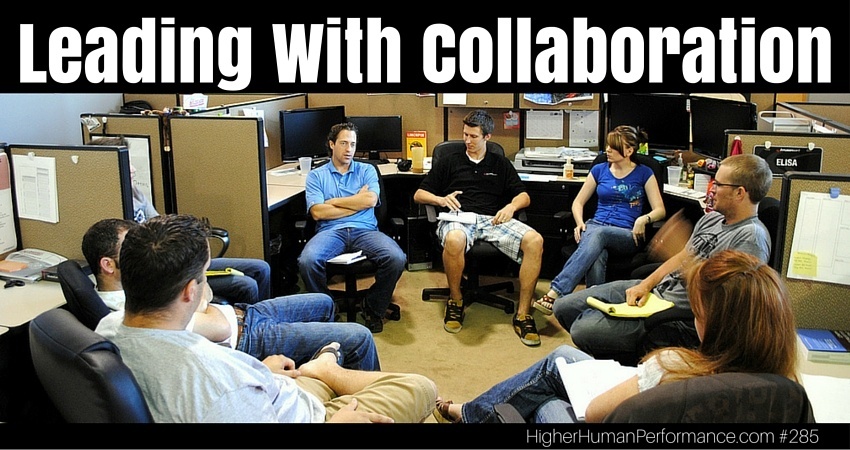




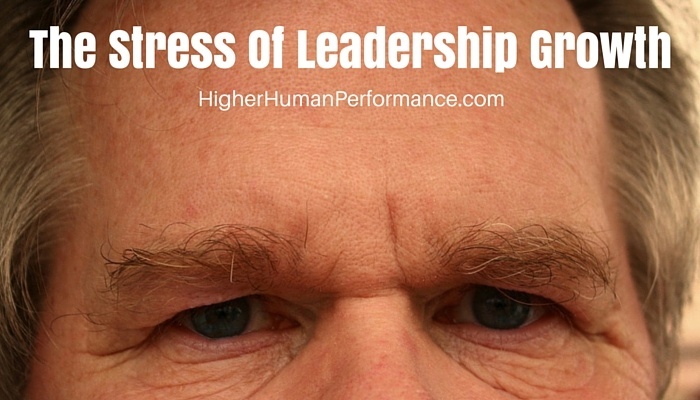




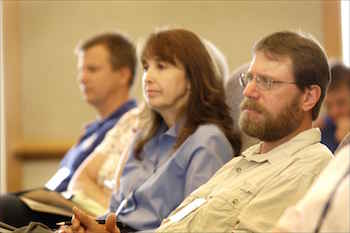
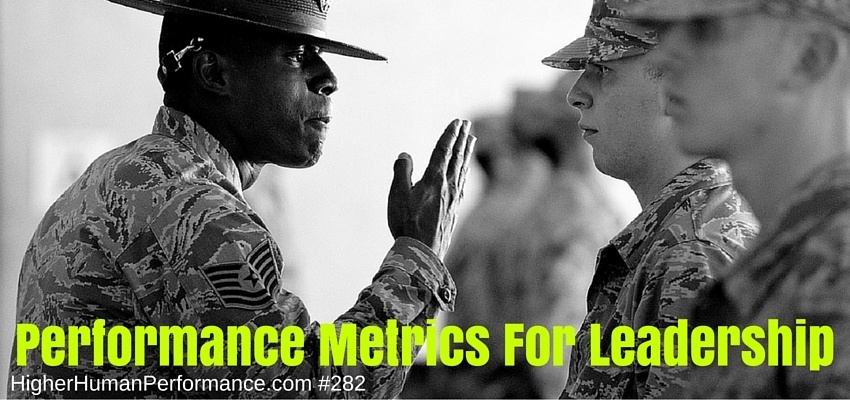


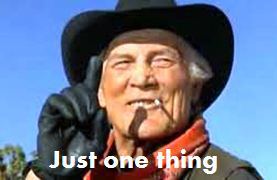 Let’s start here instead of diving headlong into specific behaviors because it’s important for us to think about WHY we do what we do, and why we want what we want. Blab wants exponential growth and user adoption. They want high user engagement. And they’re getting all of those things because they’re out front listening and responding to user feedback. They’re engaging the early adopters of the platform because they know these are the people who will fuel their growth. They also clearly want technical proficiency in the platform. That is, they want Blab to work and well.
Let’s start here instead of diving headlong into specific behaviors because it’s important for us to think about WHY we do what we do, and why we want what we want. Blab wants exponential growth and user adoption. They want high user engagement. And they’re getting all of those things because they’re out front listening and responding to user feedback. They’re engaging the early adopters of the platform because they know these are the people who will fuel their growth. They also clearly want technical proficiency in the platform. That is, they want Blab to work and well.